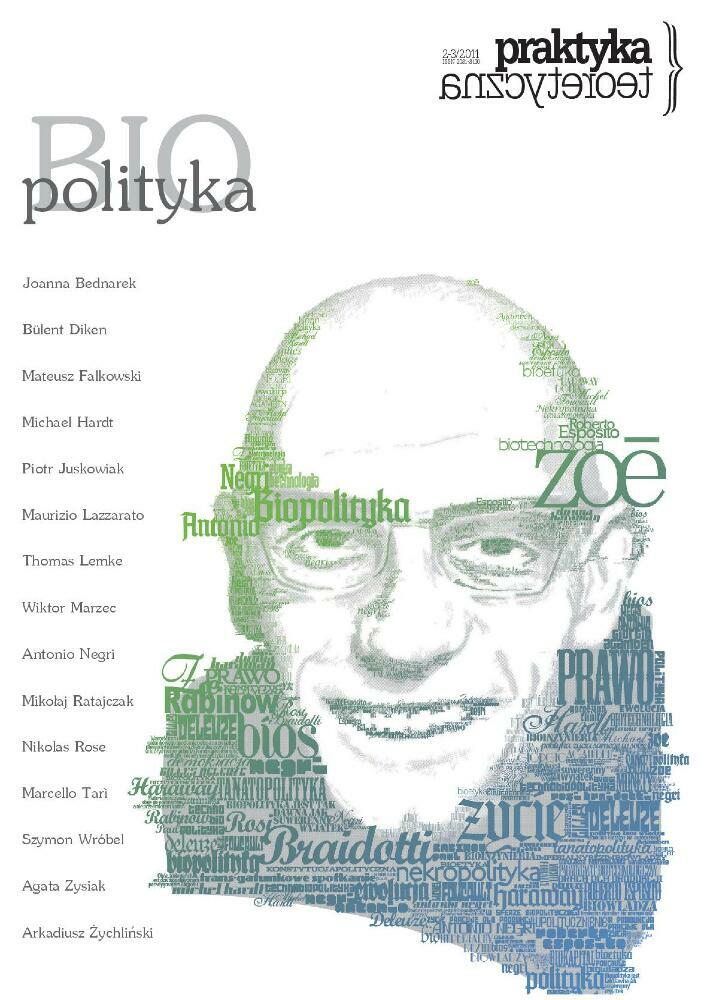Abstract
The aim of the text is to reconstruct those
aspects of Roberto Esposito’s philosophy that build the
core of his theory. The reconstruction focuses on the
concepts of communization, immunization, modernity
and biopolitics and tries to explicate the relationship
between these terms. The element that binds commu-
nization and immunization is negativity, that at the
same time makes the common life possible and presents
the biggest threat to community. Because the dialectics
between community and immunity touches the relation
between life and death, the problem of community
involves the question of biopolitics.
References
Agamben G. 2008. Co zostaje z Auschwitz?: archiwum i świadek. Homo sacer III. Warszawa: Sic!.
Agamben G. 2008. Homo sacer: suwerenna władza i nagie życie. Warszawa: Prószyński i S-ka.
Agamben G. 2008. Wspólnota. która nadchodzi. Warszawa: Sic!.
Bataille G. 1998. Doświadczenie wewnętrzne. Warszawa: Wydawnictwo KR.
Bentham J. 1995. The Panopticon Writings. London: Verso.
Benveniste E. 1974. Indo-European Language and Society. Miami.
Borradori. G. 2008. Filozofia w czasach terroru. Warszawa: Wydawnictwo Akademickie.
Campbell T. 2008. Bios. Immunity. Life: the /ought of Roberto Esposito. W R. Esposito. Bios: Biopolitics and Philosophy. Minneapolis: University of Minnesota Press.
Derrida J. 1993. Farmakon. W Pismo filozofii. Kraków: Wydawnictwo KR.
Derrida J. 1999. Wiara i wiedza: dwa źródła religii w obrębie samego rozumu. W Religia. Warszawa: Wydawnictwo Aletheia.
Derrida. J. 1997. Politics of Friendship. London-New York: Verso.
Esposito R. 2002. Immunitas: protezione e negazione della vita. Torino.
Foucault M. 1988. Technologies of the Self: a Seminar with Michel Foucault. Massachusetts: University of Massachusetts Press.
Foucault M. 1998. Trzeba bronić społeczeństwa: wykłady w College de France. 1976. Warszawa: Fundacja Aletheia.
Foucault M. 2010. Wola wiedzy. W Historia seksualności. Gdańsk: Słowo/obraz terytoria.
Haraway D. 1989. “The Biopolitics of Postmodern Bodies: Determination of Self in Immune System Discourse”. Di@er-ences (1).
Hardt M.. Negri A. Rzecz-pospolita. Kraków: Korporacja Ha!art.
Heidegger M. 1997. Czas światoobrazu. W Drogi lasu. Warszawa: Fundacja Aletheia.
Heidegger M. 2007. O istocie języka. W W drodze do języka. Warszawa: Fundacja Aletheia.
Klein J. 1982. Immunology: the Science of Self-Nonself Discrimination. New York: John Wiley & Sons Inc.
Mauss M. 1972. The General Theory of Magic. London.
Nancy J.-L. 2002. The Restlessness of the Negative. Minneapolis-London: University of Massachusetts Press.
Nancy J.-L. 2010. Rozdzielona wspólnota. Wrocław: Wydawnictwo Naukowe Dolnośląskie Szkoły Wyższej.
Sontag S. 1999. Choroba jako metafora: AIDS i jego metafory. Warszawa: Państwowy Instytut Wydawniczy.
Treichler P. 1987. „AIDS. Homophobia. and Biomedical Discourse: an Epidemic of Signification”. October 43 : 31-70.
Treichler P. 1999. How to Have theory in Epidemic: Cultural Chronicles of AIDS. Duke.
Virchow R. 1856. “Alter und neuer Vitalismus”. Archiv fur Pathologische Anatomie und Physiologie und fur Klinische Medizin 9.
Virchow R. 1858. Die Cellularpathologie in ihrer Begrundung auf physiologische und pathologische Gewebelehre dargestellt. Berlin.
License
“Theoretical Practice” seeks to put into practice the idea of open access to knowledge and broadening the domain of the commons. It serves the development of science, thinking and critical reflection. The journal is published in open-access mode under the CC-BY-NC-SA 4.0 license (detail available here: http://creativecommons.org/licenses/by-nc-sa/4.0/). Articles published in the journal may be freely distributed, stored, printed and utilized for academic and teaching purposes without restrictions.
They should not be, however, used for any commercial purposes or be reconstructed into derivative creations. Access to the journal may not be limited or offered for a fee by any third party.
Prospective authors are obliged to fill in, sign and send back the publishing contract compliant with the CC licencing. [PL.pdf, PL.doc, EN.pdf,EN.doc].
According to this contract, authors grant the journal a non-exclusive right to publish their work under the creative commons license (CC-BY-NC-SA 4.0) without any financial obligation on both sides of the contract.
Before submission authors should make sure that derivative materials they use are not protected by copyright preventing their non-commercial publication. Authors are responsible for any respective copyright violations.
